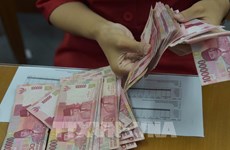Thailand's economy forecast for clear recovery momentum in 2022
Thailand's economy is forecast for clear recovery momentum in 2022 as domestic demand will remain weak in 2021, says CIMB Thai Bank (CIMBT).
 A view of Bangkok, the capital city of Thailand (Source: oneyoungworld.com)
A view of Bangkok, the capital city of Thailand (Source: oneyoungworld.com)Hanoi (VNA) - Thailand's economy is forecast for clear recovery momentum in 2022 as domestic demand will remain weak in 2021, says CIMB Thai Bank (CIMBT).
"Thailand may only post a recovery next year in the export sector because domestic demand remains weak and has sluggish prospects, especially for small businesses that face tepid sales growth," said Amonthep Chawla, head of research at CIMBT, as quoted by the Bangkok Post.
"Higher non-performing loans could cause commercial banks to be more cautious on business loan approvals. Moreover, swelling household debt is making people more reserved on spending because working hours have not returned to normal, causing income to remain lower than before the pandemic."
The ratio of household debt-to-GDP in the second quarter ballooned to 84 percent, an 18-year high. The ratio was an increase from 80 percent of GDP registered in the first quarter.
The rising household debt-to-GDP ratio and the slow recovery in income will delay the deleveraging process, which together could have an adverse impact on consumption and economic growth in the medium term, according to the latest edited minutes of the Bank of Thailand's Monetary Policy Committee.
In addition to fragile domestic demand, another downside affecting the economic recovery momentum is the baht's strengthening value against the US dollar, said Amonthep. The firmer baht affects the value of merchandise exports.
The baht appreciation stems from two main factors. The first is Thailand's trade surplus, with imports seeing slow growth as private investment recovers at a weak pace. The country's current account surplus, which represents a country's imports and exports of goods and services, payments made to foreign investors and transfers, could make the baht appreciate at a faster pace in 2021, said Amonthep.
The second factor is substantial net offshore inflows moving into Thailand's capital market from an abundance of funds in the US financial market, caused by the Federal Reserve's loose monetary policy. These inflows are identified as hot money or offshore investment seeking short-term gains through foreign exchange, interest rates and low inflation. Inflows into emerging market economies could re-emerge similar to 2008 when the Fed implemented a quantitative easing to offset the financial crisis, he said./.













